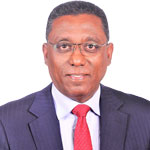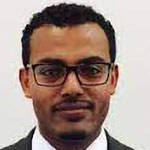
Aug 16 , 2020
By Desta Mebratu (Prof.)
Most of the analysis written and discussions held in the last couple of years on Ethiopia’s politics have been mainly focused on reinforcing the position of political parties based on isolated events and patterns.
Such an approach may be a useful feature of politics in countries where there is a consolidated and stable democratic political framework. In the absence of this, however, it could lead to a deeper political crisis that is fuelled by entrenched extreme positions.
In order to avoid such a crisis, we need to look beyond isolated events and patterns and identify the root causes through a systematic review of the underlying mental models and structural factors. And we can use systems analysis to help revisit the dominant models through the prism of systems thinking.
Most of our political challenge starts from the extreme narratives that are promoted by different groups about Ethiopia’s history. One of these narratives declares that Ethiopia has a very long and rich history, which we all should be proud of. It also believes that there are no significant incidents of repression. Even if there were, it alleges, they are not different from what other countries have gone through during their formative stages.
On the other extreme, we have political groups that believe Ethiopia is a country that was created through widespread domination and oppression of people over the last 150 years. It also believes that this history needs to be rectified and redressed fundamentally.
It is true that Ethiopia has a relatively long history that gives it a unique place in Africa and the world. Its internationally acclaimed archaeological, theological and architectural heritage is living proof for this. However, Ethiopia also has its own dark part of history as many countries do, and we all need to recognise that with some level of humility and shame.
The most rational choice we have is to acknowledge both sides of our history and build upon the positive heritage while striving to redress and avoid recurrence of past injustices. This helps in building a democratic political system based on mutual understanding and national consensus.
Another structural challenge that bears some relation to this is related to the political dispensation of the country. On the one side, we have political groups that advocate for a total ban of ethnic politics in favour of citizen politics based on individual rights. On the other extreme, we have political groups that believe that ethnic politics stand for the group rights of nationalities and is the only option to address the historical injustices and thus keep the country together.
From a systems thinking perspective, a political system exclusively based on either of the rights is untenable, as individual and group rights are complementary and interdependent. History has witnessed that many countries that claim to have a democratic system based on individual rights are still being challenged on fulfilling group rights.
The Black Lives Matter movement, which we recently witnessed in the US, is related to a lack of recognition of the deep-rooted problems related to the group’s rights. Hence, it is understandable if some of our politicians believe that Ethiopia cannot afford to put aside the question of addressing historical group repression.
However, whatever measures are taken to recognise and respect group rights should in no way infringe on the fundamental human rights of any individual. This includes the right to life, owning private property, and political participation in any part of the country. Thus, we need to create a political dispensation that reconciles both individual and group rights.
The structural challenges do not end here. There is also the current Constitution of the country. On one extreme, we have political groups that believe the Constitution is undemocratic both in content and spirit and needs to be replaced by a new one. We also have political groups that strongly believe that tampering with a Constitution that recognises the right of nationalities for self-determination would have serious political consequences.
Systems perspective tells us that a constitution is an organic document that needs to be amended with changing social dynamics. No constitution is complete in perpetuity. On the other hand, advocating for the abolishment of the current Constitution amounts to making the same mistakes of previous generations of starting from zero. Moreover, despite the limitations it may have, the existing Constitution has legal provisions that could form a sufficient basis for a democratic transition. In this context, the focus has to be on resolving the inherent conflicts and continuously addressing its limitations through an inclusive and consultative process.
A challenge closely relating to the issue of the Constitution is the existing federal system of government. Some political groups consider the existing federal structure along lingo-cultural fault lines as a major source of human rights abuse that may potentially lead to the disintegration of the country. We also have another group of political parties that hold that the existing federal structure is the foundation for the “new” Ethiopia and changing it would be unthinkable.
On the positive side, by and large, both sides believe that a federal structure is the only viable state structure for the country. From a systems thinking perspective, the effectiveness of a federal structure is measured by its capacity to reconcile individual and group rights and facilitate sustainable development. In this regard, even if the existing federal structure responds to the long-standing question of self-administration, some of its provisions have opened doors for gross violations of basic human rights and adversely affected developmental effectiveness. The rational choice, in this regard, is to enhance the inclusiveness and developmental effectiveness of the existing federal structure through an adaptive modification that responds to adjusting social changes.
These structural challenges require a holistic and integrated consideration as they are very much interconnected with and interdependent on one another. Effectively addressing these challenges, which are related to the dominant mental models of our politics, will require going through stages of collaborative thinking that is transformational.
The divergence stage is the stage at which all political parties strive to create the space for listening and appreciating every divergent view with an open heart and mind. Next comes the emergence stage during which effort shall be made to understand the real and perceived concerns and the main sources of conflicting views. The convergence stage builds upon the mutual trust and confidence created by the first two stages and develops the key structural elements of the collaboration framework for building a more stable and democratic political future for the country. Some may call this process a grand bargain.
Going through such collaborative thinking requires a strong commitment by the politicians to submit to the long-term interest of the people and the country.
Every political party that claims to represent different segments of the population is part of the prevailing political system. The stability and health of the political system is determined by the individual and collective interaction between these parties. Therefore, none of the parties can absolve themselves from being collectively responsible for any political crisis the country may face.
In this context, the primary task of any party that stands for the rights and sustainable development of its constituency is to be subservient to the sovereignty of the people and collaboratively develop the roadmap for addressing key structural challenges.
Systems thinking can help in guiding this process on a collaborative basis. Most importantly, the youth of this country need to liberate themselves from the remnants of an antiquated mindset and utilise the knowledge and technological opportunities of the 21st century to positively shape their future and the future of this country.
PUBLISHED ON
Aug 16,2020 [ VOL
21 , NO
1059]


Commentaries | Jul 10,2020

Life Matters | Mar 06,2021

Fortune News | Sep 30,2023

Viewpoints | Oct 03,2020

Radar | Aug 08,2020

Verbatim | Oct 23,2021

Commentaries | Apr 03,2021

Commentaries | Jul 30,2022

Editorial | Aug 26,2023

Commentaries | Jul 07,2024

My Opinion | 131656 Views | Aug 14,2021

My Opinion | 128020 Views | Aug 21,2021

My Opinion | 125983 Views | Sep 10,2021

My Opinion | 123607 Views | Aug 07,2021

Dec 22 , 2024 . By TIZITA SHEWAFERAW
Charged with transforming colossal state-owned enterprises into modern and competitiv...

Aug 18 , 2024 . By AKSAH ITALO
Although predictable Yonas Zerihun's job in the ride-hailing service is not immune to...

Jul 28 , 2024 . By TIZITA SHEWAFERAW
Unhabitual, perhaps too many, Samuel Gebreyohannes, 38, used to occasionally enjoy a couple of beers at breakfast. However, he recently swit...

Jul 13 , 2024 . By AKSAH ITALO
Investors who rely on tractors, trucks, and field vehicles for commuting, transporting commodities, and f...

Jun 28 , 2025
Meseret Damtie, the assertive auditor general, has never been shy about naming names...

Jun 21 , 2025
A well-worn adage says, “Budget is not destiny, but it is direction.” Examining t...

Jun 14 , 2025
Yet again, the Horn of Africa is bracing for trouble. A region already frayed by wars...

Jun 7 , 2025
Few promises shine brighter in Addis Abeba than the pledge of a roof for every family...

Jun 29 , 2025
Addis Abeba's first rains have coincided with a sweeping rise in private school tuition, prompting the city's education...

Jun 29 , 2025 . By BEZAWIT HULUAGER
Central Bank Governor Mamo Mihretu claimed a bold reconfiguration of monetary policy...

Jun 29 , 2025 . By BEZAWIT HULUAGER
The federal government is betting on a sweeping overhaul of the driver licensing regi...

Jun 29 , 2025 . By NAHOM AYELE
Gadaa Bank has listed 1.2 million shares on the Ethiopian Securities Exchange (ESX),...